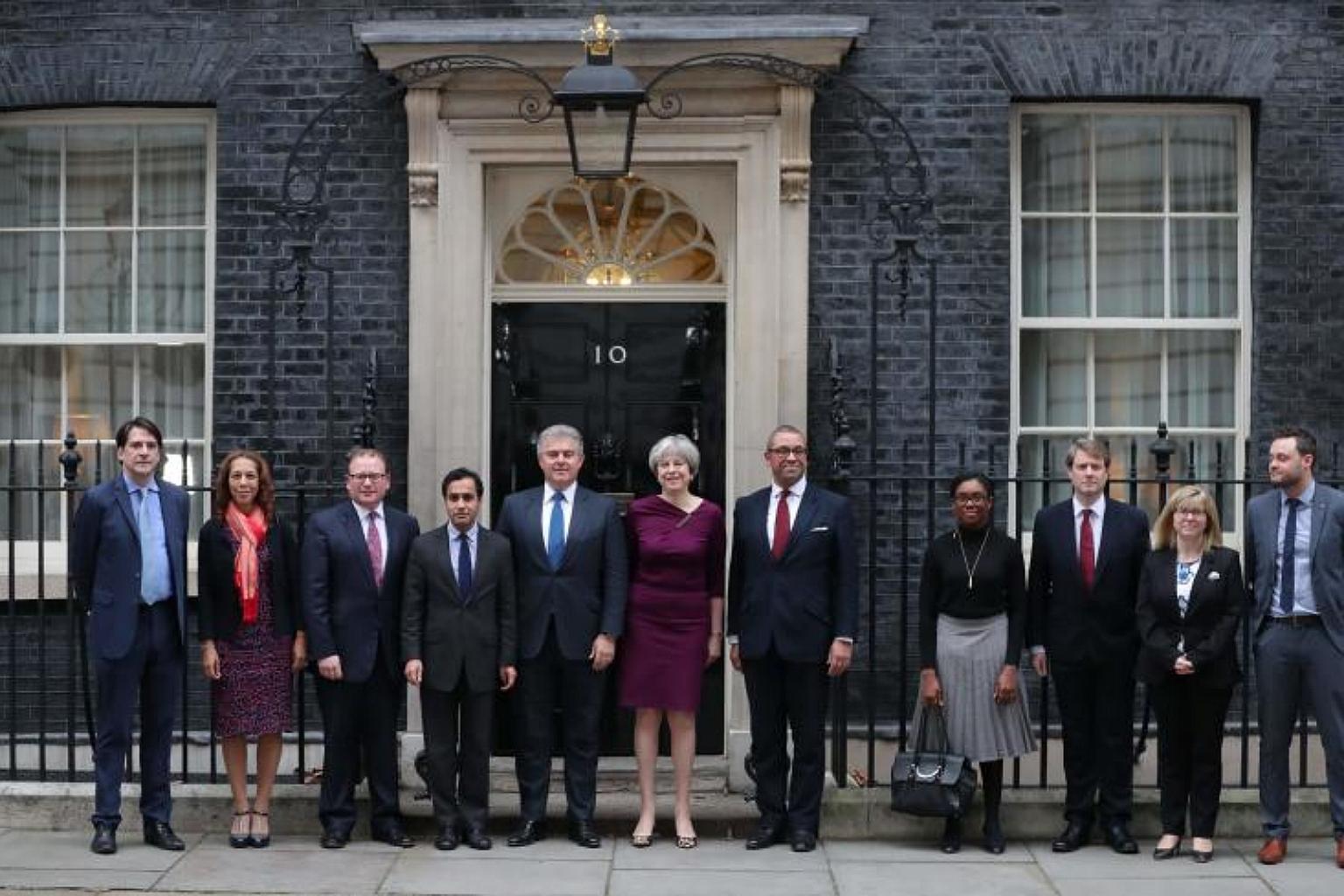News analysis
Britain's Cabinet reshuffle fails to bolster Theresa May's position
Sign up now: Get ST's newsletters delivered to your inbox

British Prime Minister Theresa May began a major reshuffle of her Cabinet on Jan 8.
PHOTO: AFP
LONDON - Britain has a revamped Cabinet, in which ministers who adopt a more moderate stance towards the European Union, and who want their country to maintain cordial relations with the EU after the British leave the Union next year, appear to be in the ascendancy.
But the Cabinet reshuffle which Prime Minister Theresa May implemented on Monday (Jan 8) has failed to bolster her position, both inside her ruling Conservative party and the country. And it may be the harbinger of future political troubles for Mrs May.
Although the outgoing British Cabinet was only formed in the aftermath of last June's general election, a reshuffle of ministerial seats became inevitable after Mr Damian Green, the Deputy Prime Minister and one of Theresa May's closest advisers, was forced to resign shortly before Christmas because of allegations of sexual harassment against colleagues.
It was acknowledged from the start in London that, although the reshuffle theoretically gave Mrs May the chance to improve the workings of government and tighten control over her Cabinet, the fact that Mrs May does not enjoy an overall majority in parliament means that her ability to appoint and dismiss ministers would always be limited.
And so it proved: the ministers responsible for the biggest divisions inside the Cabinet were left untouched. These include Finance Minister Philip Hammond who has angered many ruling Conservative MPs by often appearing to undermine the government's position in the separation negotiations with the European Union, as well as Foreign Minister Boris Johnson, who often amuses the media with his apparently patchy understanding of the finer points of diplomacy and is regarded as fundamentally disloyal.
Both remain unmoved, as does Mr David Davis, the minister responsible for handling the EU divorce talks, another thorn in the PM's flesh. Mrs May judged - probably correctly - that she could not afford to have any of them dismissed from the Cabinet and sulk on the parliamentary backbenches, where they may pose a mortal threat to her rule.
Nevertheless, the British leader did make a handful of personnel changes which, although not necessarily attention-grabbing, will improve her handling of policy. The first was the appointment of Mr Brandon Lewis, a 46-year-old MP highly regarded by his peers, as the ruling Conservative party's chairman, a key post which requires total loyalty to the PM.
She also promoted James Cleverly, the son of African immigrants and a relatively new MP, to the post of deputy party leader; Mr Cleverly, who served as an army officer, is seen as a fast-rising political star, fully deserving his family name, as the joke among his colleagues goes.
Significantly, the PM appointed Mr David Lidington, another loyal supporter, as Cabinet Office Minister, a position which entails the coordination of policy across government departments. Mr Lidington served previously as Europe Minister and is famous for his fine grasp of EU bureaucratic detail; he is also an ardent pro-European, so his appointment is intended to signal the PM's preference for a separation deal with the EU which maintains as many of Britain's links with Europe as possible.
Still, the reshuffle was chaotic, and thereby failed to boost Mrs May's authority. Conservative party headquarters initially identified the wrong person as the new party chief, a mistake which recalled the goofy comedy of errors at the party conference last year, when letters from a slogan on the party platform started dropping as the PM was speaking.
More damagingly still, two ministers refused to be moved to new positions; one - Justine Greening, the Education Secretary - simply resigned, while the other, Jeremy Hunt, the Health Secretary, successful persuaded the PM that he should remain in his post. Mrs May's inability to impose her will on her ministers and the failure of her advisers to prepare the ground adequately for the reshuffle will do nothing to enhance her claim for competence.
Be that as it may, Theresa May looks safe for the moment. There is no single candidate within the Conservative party who could take her job. And in her own, often unstated way, the PM can still surprise. Few political observers in London believed that she would be able to conclude the preliminary separation negotiations with the EU by the end of last year, but she did so.
And although she is not particularly good at asserting her authority, she is very good at absorbing political blows and persevering. And that may turn out to be her biggest asset.


